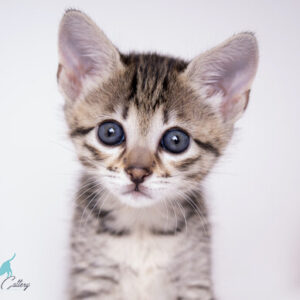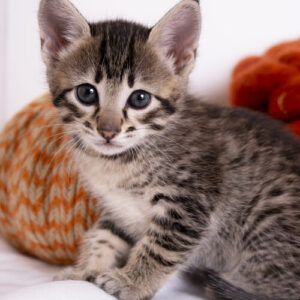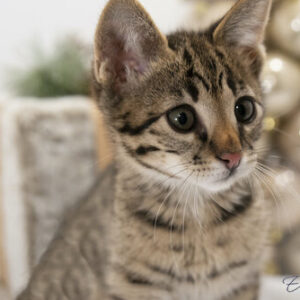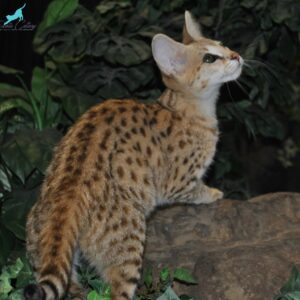Description
Buy F1 Female Savannah cat/kittens
F1 female Savannah cats/kittens are the epitome of exotic feline beauty and wildness in a domestic package. These magnificent creatures have captivated cat enthusiasts worldwide since their creation, Dasha – F1 Female Savannah.
At ExoticCattery, we’re passionate about F1 female Savannahs and want to share our knowledge with you. Dasha – F1 Female Savannah.
What is an F1 Female Savannah Cat/kitten?
F1 Savannah cats/kittens are the first-generation offspring of an African Serval and a domestic cat.
The “F1” designation means they’re 50% Serval, resulting in the most wild-looking and largest Savannahs.
F1 Savannahs have a distinct mix of domestic and wild features since they inherit qualities from both parents.
The History of F1 Female Savannah Cats
The first Savannah cat was created in the 1980s through the innovative experiment of breeder Judee Frank crossing an African Serval with a domestic cat. Another important early breeder of Savannah cats was Lorre Smith. In 2012, the International Cat Association (TICA) recognized Savannahs as championship breeds.Dasha – F1 Female Savannah
Characteristics of F1 Female Savannah Cats
Physical Appearance and Size
F1 female Savannahs are known for their striking appearance:
- Tall, lean bodies
- Long legs
- Large, pointed ears
- Distinctive spotted coats
Their size and wild features make them truly remarkable among domestic cats.
Temperament and Personality Traits
F1 female Savannah cats have unique personalities:
- Highly intelligent
- Energetic and playful
- Loyal to their owners
- Often described as dog-like in behavior
Lifespan and Health Considerations
With proper care, F1 female Savannahs can live 12-20 years.
Care and Maintenance of F1 Female Savannah Cats
Dietary Requirements
F1 Savannah cats need a high-protein diet to match their wild ancestry.
We recommend:
- High-quality commercial cat food formulated for active breeds
- Raw or cooked meat supplements
- Avoid grains and fillers
Consult with a vet to create the best diet plan for your F1 female Savannah.
Exercise and Playtime Needs
These energetic cats require lots of exercise:
- Provide large cat trees and climbing structures
- Interactive toys to stimulate their hunting instincts
- Daily play sessions with their owners
Consider leash training your F1 female Savannah for outdoor adventures.
Grooming and Hygiene
Despite their wild appearance, F1 Savannahs are relatively low-maintenance:
- Brush weekly to remove loose hair
- Trim nails regularly
- Clean ears and teeth as needed
F1 Female Savannah Kittens for sale
Early Development Stages
F1 Savannah kittens develop rapidly:
- Eyes open around 10 days old
- Begin walking at 3 weeks
- Start eating solid food at 4-5 weeks
They’re incredibly active and curious from a young age.
Socialization and Training Tips
Early socialization is crucial for F1 female Savannah kittens:
- Expose them to various people, animals, and environments
- Start training early – they can learn tricks and commands
- Use positive reinforcement techniques
Consistent training helps channel their wild energy into positive behaviors.
Health Considerations for F1 Savannah Kittens
F1 Savannah kitten care requires special attention:
- Regular vet check-ups
- Proper vaccinations
- Monitoring for genetic health issues
Legal Considerations for Owning an F1 Female Savannah
Regulations and Restrictions in Different Regions
Owning an F1 female Savannah isn’t legal everywhere:
- Some states and countries prohibit hybrid cats
- Others require special permits
Research local laws before buying an F1 female Savannah kitten.
Licensing and Permit Requirements
In areas where F1 Savannahs are legal, you may need:
- Exotic pet licenses
- Special enclosure requirements
- Proof of purchase from a licensed breeder
Always comply with local regulations to ensure a happy home for your F1 Savannah.
How much does an F1 female Savannah cat cost?
F1 Savannah cat/kitten prices typically range from $5,000 to $20,000.
Factors affecting cost include:
- Breeder reputation
- Cat’s appearance and temperament
- Demand and availability
At Exotic Cattery, we offer competitive prices for our high-quality F1 female Savannahs for sale.
Are F1 female Savannah cats good pets?
F1 female Savannahs can make excellent pets for the right owners.
They’re:
- Loyal and affectionate with their families
- Highly intelligent and trainable
- Active and entertaining
How big do F1 female Savannah cats get?
F1 female Savannah cats are among the largest domestic cats:
- Height: 14-16 inches at the shoulder
- Length: Up to 22 inches (body only)
- Weight: 15-25 pounds
Do F1 Savannah cats make good house pets?
With proper care and environment, F1 Savannahs can be wonderful house pets:
- They bond strongly with their families
- They’re highly interactive and playful
Are F1 Savannah cats dangerous?
While not inherently dangerous, F1 Savannah cats require respect and understanding:
- They have strong hunting instincts
- They may be too rough for small children
- Proper training and socialization are essential
In the right hands, F1 Savannahs are no more dangerous than other large, active cat breeds.
Cost of Owning an F1 Female Savannah
Initial Purchase Price
F1 Savannah cat prices are at the top of the exotic pet market:
- Range from $15,000 to $25,000
- Depends on breeder reputation and cat quality
- Exotic Cattery offers competitive pricing for top-quality F1 females
This high cost reflects the rarity and desirability of F1 Savannahs.
Ongoing Expenses
F1 female Savannah cat ownership comes with ongoing costs:
- High-quality food: $100-$150 per month
- Veterinary care: $500-$1000 annually
- Pet insurance: $30-$50 per month
- Toys and enrichment: $50-$100 per month
- Specialized cat furniture: $200-$500 annually
Budget for these expenses to ensure your F1 Savannah thrives.
Finding and Choosing an F1 Female Savannah
Reputable Breeders vs. Adoption
F1 Savannah cats are rarely available for adoption due to their rarity.
Choosing a reputable breeder is crucial:
- Research breeder backgrounds and reputations
- Ask for health certifications and genetic testing
- Visit the cattery if possible
Exotic Cattery prides itself on ethical breeding practices and healthy kittens.
What to Look for When Selecting an F1 Female Savannah
When choosing your F1 female Savannah, consider:
- Health: Clear eyes, clean ears, no signs of illness
- Temperament: Alert, curious, and interactive
- Physical traits: Tall, lean body with distinctive spots
Take your time to find the perfect match for your lifestyle.
F1 Female Savannah vs. Other Savannah Generations
Comparison of Traits and Characteristics
F1 Savannahs differ from lower generations:
- Size: F1s are largest, with size decreasing in later generations
- Wild appearance: F1s look most like Servals
- Temperament: F1s retain more wild behaviors
Learn about other Savannah generations to understand the differences.
Pros and Cons of F1 vs. Lower Generation Savannahs
F1 Pros:
- Most exotic appearance
- Highest intelligence and energy levels
- Rarest and most valuable
F1 Cons:
- Highest cost
- More challenging to care for
- May have fertility issues
Lower generations offer a more “domestic” experience while retaining some exotic traits.
Common Misconceptions about F1 Female Savannahs
Addressing Myths and Misunderstandings
Let’s debunk some F1 Savannah cat myths:
Myth: They’re dangerous wild animals. Reality: F1s are domestic cats with wild ancestry, not pure wild animals.
Myth: They can’t be litter trained. Reality: F1 Savannahs can learn to use a litter box like any other cat.
Myth: They don’t bond with humans. Reality: F1s can form strong bonds with their owners when properly socialized.
Reality of Owning an F1 Female Savannah
Owning an F1 female Savannah is rewarding but challenging:
- They require more attention and interaction than average cats
- Their high energy levels need appropriate outlets
- They’re not suitable for households with small children or other small pets
Understanding these realities helps ensure a successful F1 Savannah ownership experience.
Is an F1 Female Savannah Right for You?
Recap of Key Points
F1 female Savannahs are:
- Exotic, large, and striking in appearance
- Highly intelligent and active
- Expensive to purchase and maintain
- Requiring experienced, dedicated owners
Considerations for Potential Owners
Before getting an F1 Savannah, ask yourself:
- Can you provide the space and enrichment they need?
- Are you prepared for the financial commitment?
- Do local laws allow F1 Savannahs?
- Can you handle their high energy and intelligence?
How long do F1 Savannah cats live?
F1 Savannah cats typically live 12-20 years with proper care.
Factors affecting lifespan include:
- Diet quality
- Regular veterinary care
- Exercise and mental stimulation
Providing a healthy lifestyle can help your F1 Savannah reach its full life potential.
Can F1 Savannah cats be left alone?
F1 Savannahs don’t do well when left alone for long periods:
- They’re highly social and bond closely with owners
- They need regular interaction and stimulation
- Long periods alone can lead to destructive behaviors
If you’re often away, consider a lower generation Savannah or a different breed. Dasha – F1 Female Savannah.
Do F1 Savannah cats get along with dogs?
With proper introduction, F1 Savannahs can coexist with dogs:
- They often enjoy the company of dog-like companions
- Size compatibility is important – large dogs may be best
- Supervised introductions and gradual acclimation are key
Are F1 Savannah cats good for first-time cat owners?
F1 Savannahs are generally not recommended for first-time cat owners:
- They require experienced handling
- Their needs are more complex than average cats
- The financial investment is significant
First-time owners might consider lower generation Savannahs for a more manageable experience.
How often do F1 Savannah cats need to visit the vet?
F1 Savannah cats need regular vet visits:
- Bi-annual visits for older cats
- Immediate care for any health concerns
- High Energy: Savannah cats are full of energy and require lots of mental and physical activity.
- Size & Strength: These cats can get very big. …
- Exotic Pet Rules: Depending on where you live, there may be legal limits or extra conditions for owning a Savannah cat. Dasha – F1 Female Savannah.
TAGS:
f1 savannah cat for sale, f1 savannah cat for sale near me, f1 savannah cat for sale uk, f1 savannah cat for sale uk price, f1 savannah cat for sale london, f1 savannah cat for sale uk price near me, f1 savannah cat for sale uk cheap, f1 savannah cat for sale south africa, f1 savannah cat for sale canada, f1 savannah cat for sale scotland, f2 serval cat for sale uk, f2 savannah kittens for sale near me,
how much does an f2 savannah cat cost, are f1 savannah cats legal, what is an f2 savannah cat, f1 savannah cat for sale craigslist, f1 savannah cat for sale california, f1 savannah for sale, buy f1 savannah cat, f1 savannah cat price, savannah f1 cat price, g2 savannah cat, f1 savannah cat for sale florida, f1 savannah cat breeders uk, savannah cat f1 cost, s2 savannah cat, f2 savannah cats for sale, f1 savannah cat for sale cheap, f3 savannah cat for sale near me, savannah f4 cat for sale, savannah f4 cat price, f5 savannah cat for sale near me, savannah f5 cat price, f6 savannah cat for sale, f6 savannah kittens for sale, f7 savannah cat for sale, f8 savannah cat for sale, savannah f1 kittens for sale.








